
Local authorities plan to boost medical tourism in Gachsaran town, southwestern Kohgiluyeh and Boyer-Ahmad province, the provincial tourism chief has said. Infrastructure has been provided in Gachsaran to facilitate the development of health tourism, Majid Safai announced on Saturday. “There is a strong capacity for the development of the tourism industry, especially health tourism, in the city because of the airport and its fast air access to medical facilities and equipment,” the official explained. Citing an example, the official reminded of a special hospital dedicated to mothers and children which offeres quality servives to domestic and foreign patients. During the coronavirus outbreak, 350 foreign tourists received visas to use the medical services provided by the hospital mentioned, he noted. Many domestic experts believe that medical tourism in Iran is a win-win opportunity both for the country and foreign patients, as they are offered affordable yet quality treatment services and the country gains considerable foreign currency. Iran is one of the major destinations for health tourism in the region, and patients with 55 different nationalities, mostly from neighboring countries including Iraq, Kuwait, Bahrain, Qatar, Saudi Arabia, Oman, Pakistan, Afghanistan, Tajikistan, and Turkmenistan are seeking to use Iran’s services and facilities in this field. The Islamic Republic has set its goals to exceed its yearly medical travelers to around 2 million in the Iranian calendar year 1404.
Create: Dec 12, 2021 Edit: Dec 12, 2021 Regional News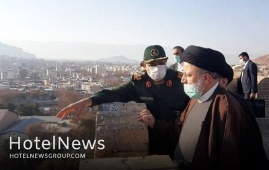
ed by members of his cabinet, including Energy Minister, Industry, Mining, and Trade Minister, Agriculture Minister, Culture Minister as well as Cooperatives, Labor and Social Welfare Minister. Falak-ol-Aflak is an imposing monument of Sassanids, which dominates the capital city of Khorramabad in western Iran. The unmissable eight-towered monument seems particularly dramatic when floodlit at night, offering picturesque views of its encircling crenelated battlements. Lorestan is a region of raw beauty that an avid nature lover could spend weeks exploring. The region was inhabited by Iranian Indo-European peoples, including the Medes, c. 1000 BC. Cimmerians and Scythians intermittently ruled the region from about 700 to 625 BC. Lorestan was incorporated into the growing Achaemenid Empire in about 540 BC and successively was part of the Seleucid, Parthian, and Sassanid dynasties.
Create: Dec 11, 2021 Edit: Dec 11, 2021 Regional News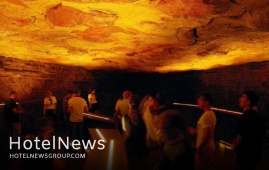
United Nations World Tourism Organization (UNWTO) and the Council of Europe will work together to develop the opportunities tourism offers to local communities and to enhance the tourist experience along the European region’s Cultural Routes. The joint actions will be aimed at recognizing the added value that cultural routes offer for sustainable tourism development, cultural heritage safeguarding and intercultural dialogue. The collaboration will also further highlight the routes’ potential for advancing social, economic and cultural development, benefitting both Europe and its partner countries by strengthening cultural and historical ties. International Year of Creative Economy 2021 The two organizations will be collaborating first in the sphere of creative tourism, to showcase good practices in line with the International Year of Creative Economy 2021, and further promote destinations encompassed by the Enlarged Partial Agreement on Cultural Routes (EPA) of the Council of Europe. UNWTO Secretary-General Zurab Pololikashvili said: “All along the Cultural Routes, tourism has the power to support jobs and create other development opportunities for communities. It is also a chance to protect and promote cultural heritage and to celebrate creativity.” Council of Europe Secretary General Marija Pejčinović Burić adds: “The Cultural Routes programme plays an important role in the promotion of Europe’s rich cultural heritage, in addition to being an effective tool for fostering intercultural dialogue and transnational co-operation. We are delighted that the UN’s World Tourism Organisation will contribute its expertise to the Cultural Routes programme on the basis of this Memorandum of Understanding.” Enhancing accessibility The partnership will also see UNWTO and the Council of Europe harness their individual expertise and technical capabilities to further develop Cultural Routes, through research, training and policymaking. Special attention will be paid to the mapping of Cultural Routes and to promoting greater accessibility for persons with disabilities and specific access requirements.
Create: Nov 26, 2021 Edit: Nov 26, 2021 International News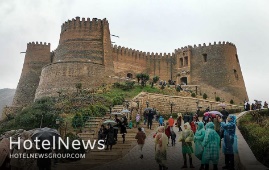
The construction of a fence wall has been completed around Falak-ol-Aflak fortress, an imposing monument of Sassanids, which dominates the capital city of Khorramabad in western Iran. “The wall has been constructed based on the original model and historical documents,” Lorestan province’s tourism chief said on Sunday. “Moreover, traditional materials have been used in the recent construction that has harmony with the fortress.” The unmissable eight-towered monument seems particularly dramatic when floodlit at night, offering picturesque views of its encircling crenelated battlements. Lorestan is a region of raw beauty that an avid nature lover could spend weeks exploring. The region was inhabited by Iranian Indo-European peoples, including the Medes, c. 1000 BC. Cimmerians and Scythians intermittently ruled the region from about 700 to 625 BC. One of the most prominent archaeological findings of the fertile region is the ancient “Luristan Bronzes”, which are noted for their eclectic array of Assyrian, Babylonian, and Iranian artistic motifs. Lorestan was incorporated into the growing Achaemenid Empire in about 540 BC and successively was part of the Seleucid, Parthian, and Sassanid dynasties.
Create: Nov 15, 2021 Edit: Nov 15, 2021 Regional News
The Federal Communications Commission has authorized a satellite internet project from Boeing first proposed in 2017. Boeing can now move forward with building, launching, and operating its own broadband internet network from space, joining its main aerospace competitor SpaceX. Boeing’s plan involves placing 132 satellites into low Earth orbit at an altitude of 1,056 kilometers (about 656 miles). Another 15 will be launched to “non geostationary orbit” at an altitude between 27,355 and 44,221 km (16,998 to 27,478 miles). The company says it wants to use the satellites to offer “broadband internet and communications services to residential consumers, government and business users in the United States, Puerto Rico and the US Virgin Islands” while the network gets built out, and on a global basis once it’s complete. All 147 satellites would broadcast in the V-band, a higher-frequency slice of the wireless spectrum than the Ka and Ku bands used by SpaceX’s Starlink network or Amazon’s yet-to-be-deployed Project Kuiper satellites. Using V-band could allow for faster data transfer rates but runs a greater risk of interference because the higher frequencies have more trouble penetrating solid objects. (SpaceX has plans to use the V-band in some future satellites, and so does OneWeb. The Ka and Ku bands are also used by satellites that provide in-flight internet on commercial airlines.) SPACEX HAD TOLD THE FCC IT WAS CONCERNED BOEING’S NETWORK WOULD CROWD LOW EARTH ORBIT SpaceX has previously expressed concern that Boeing’s proposal to launch into already-crowded low orbits could increase the risk of a collision with other satellites. In 2019, SpaceX said to the FCC that it believed Boeing’s network would create a “clear danger of harmful interference,” according to Reuters. SpaceX’s Starlink satellites orbit the Earth at an altitude of around 550 km (roughly 342 miles), which is around where OneWeb’s internet satellite constellation can be found (and where Amazon’s satellites will go once they launch). SpaceX and OneWeb narrowly avoided a collision earlier this year. Boeing now has six years to launch half of its satellite constellation and nine years to deploy the entire network. The company had asked the FCC to loosen those requirements — it wanted to only commit to launching five satellites in the first six years, and asked for a 12-year window to launch the entire constellation — but the commission denied that request, according to the order published Wednesday. By comparison, SpaceX and Amazon have far grander plans for their networks, with each consisting of thousands of satellites. Boeing is a major satellite manufacturer, and so it spent the years before and after its initial 2017 proposal selling to early space-based internet providers as the market matured. But providers are now expected to collectively generate more than $50 billion by 2031, which could explain why Boeing bothered slogging through four years of the approval process.
Create: Nov 5, 2021 Edit: Nov 5, 2021 International News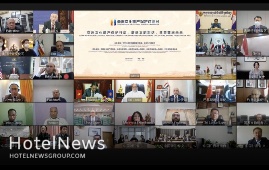
The Islamic Republic of Iran is prepared to offer expertise for the conservation of historical monuments and relics in Asia. On Thursday, Hadi Ahmadi-Roueeni, a senior official with the Ministry of Cultural Heritage, Tourism and Handicrafts announced the country’s readiness to share experience for the preservation of historical monuments with Asian countries, Iran Press reported. Establishing a fund to protect endangered cultural heritage in Asia and border-free associations of professionals in Asia as well as sharing experiences among the continental expert community would improve the conservation of the legacies, the official explained. He also called on all countries to join hands in various realms of political, academic, and professional levels to help restore the endangered historical legacies in countries suffering such problems as war, unrest, and occupation. Ahmadi-Roueeni made the remarks on Thursday on the second day of the first forum of “Asian Dialogue for Cultural Heritage Conservation” which was virtually held in China. The biggest Asian cultural heritage event is hosted by China on October 27 and 28 with the slogan of “Promoting Dialogue among Civilizations and Shaping the Future of the Asian”. According to organizers, the dialogue aims to move forward with the Asian Initiative for Cultural Heritage Conservation and open a new chapter for exchanges and mutual learning among Asian civilizations. Senior officials from 36 Asian countries and five international organizations including UNESCO, the International Council of Museums, and the International Council on Monuments and Sites participated in the conference in the form of an online meeting, Global Times reported. At the conference, the Asian Alliance for Cultural Heritage Conservation was jointly initiated by 10 Asian countries – China, Iran, Armenia, Cambodia, the Democratic People's Republic of Korea, Kyrgyzstan, Pakistan, Syria, the United Arab Emirates, and Yemen – was officially established. According to data from the UNESCO World Heritage Center, about 50 percent of the world’s endangered world cultural heritage sites are located in Asia. “Preserving our heritage is not a luxury – it is a prerequisite for ensuring that future generations can inherit an identity, a history, a voice, and a sense of ownership of their past and future,” said Xing Qu, deputy director-general of UNESCO. Xing expressed thanks to China for organizing the event and for helping to address the challenges facing cultural heritage. The ceremony also set up the Asian Fund for Cultural Heritage Conservation as a special fund to support programs and projects in conservation, research, and joint archaeology concerning cultural heritage conservation in Asia.
Create: Oct 31, 2021 Edit: Oct 31, 2021 Regional News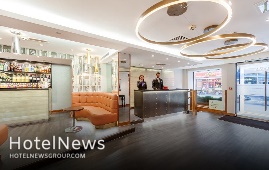
Cycas Hospitality, the award-winning pan-European operator, has signed a deal to operate London Town Group’s portfolio of upscale boutique hotels in the UK capital. The London Town Group of Companies, founded by Koolesh Shah, is one of the UK’s leading, privately-held real estate and energy investment companies. The agreement sees Cycas welcome its first two Mercure-branded hotels – part of Accor – to its portfolio. While the 72-room Mercure London Hyde Park – set within a Grade II listed building – recently completed a multi-million-pound refurbishment, the 86-room Mercure London Paddington is scheduled to start a fully renovation programme next year. As part of the extensive works, the hotel will upgrade its ground floor food and beverage facilities and transform its top floor into a rooftop bar.As Cycas’s seventh IHG-branded property, the 64-room Hotel Indigo London Paddington becomes its first Hotel Indigo in London and joins Hotel Indigo Dundee as its second in the UK. All three properties offer a wide range of dining options, meetings facilities and state-of-the-art fitness centres, all just a short walk from Hyde Park and Paddington Station, whose access will be further boosted with next year’s opening of Crossrail and the Elizabeth Line. Cycas has appointed Tanja Furby as Cluster General Manager for the three London hotels. A seasoned operator who has worked across a wide range of leading hospitality brands, Tanja’s commercial skills, leadership and local knowledge will help Cycas maximise each property’s customer offering. Koolesh Shah, Founder of London Town Group, said “As our business diversifies and grows, I felt now was the time to bring on board a recognised industry leader in hotel operations to partner on the transformation journey of our hotels. “We’ve always prided ourselves on our collection of leading branded-boutique hotels, and we’re confident that Cycas’s track-record in delivering the highest hospitality standards will ensure we can continue to give our guests the best possible experience.” Matt Luscombe, Chief Executive Officer at Cycas Hospitality, said: “I’ve known and admired Koolesh and his team for many years, since he opened the first Hotel Indigo outside of North America in 2009. Over the last decade, London Town Group has been synonymous with commercial and operational excellence. “With their central locations and exceptional transport links, these three hotels are ideally positioned to capitalise on the recovery in business and leisure travel. We’re proud and excited to begin this partnership together. The deal follows continued expansion for Cycas Hospitality, which has now opened or taken over 17 hotels in 12 months, despite the challenges posed by the Covid-19 pandemic,
Create: Oct 31, 2021 Edit: Oct 31, 2021 International News
The Ritz-Carlton Hotel Company, L.L.C. is excited to announce the debut of The Ritz-Carlton, Mexico City, providing discerning travelers with a new way to discover one of the world’s most dynamic destinations. Transforming the city’s skyline and sitting amongst the country’s tallest buildings, the hotel is centrally located along the iconic Paseo de Reforma and showcases uninterrupted views of the famed Chapultepec Park. Featuring the legendary service of the brand’s Ladies and Gentlemen, each detail of the hotel is thoughtfully designed to immerse guests in the city’s rich culture and offer a unique perspective on this beloved destination. Featuring unparalleled service, The Ritz-Carlton, Mexico City celebrates legendary Mexican hospitality and offers guests a highly personalized experience. The hotel features a wide range of carefully curated amenities designed for cultural discovery and epicurean adventures or business travel, including The Ritz-Carlton Club® Lounge with an exclusive Club Concierge, a heated indoor swimming pool, large fitness center with state-of-the-art equipment and a signature Ritz-Carlton Spa with six luxurious treatment rooms. Bringing the destination to life in a unique way, The Ritz-Carlton Spa thoughtfully sources local ingredients and botanicals, which are then coupled with the healing and spiritual traditions of Mexico City’s Aztec culture. In addition to relaxing and rejuvenating treatments, the spa features an assortment of wellness areas, including steam rooms, saunas, and a timeless capsule room. Dining at Samos, the Mediterranean inspired restaurant on the 38th floor of The Ritz-Carlton, Mexico City, guests can enjoy cuisine featuring dynamic local flavors for a one-of-a-kind experience. Bringing vast luxury experience and expertise in Mexican, Italian, French, Peruvian and Argentinian cuisines, Chef Jonathan Felix has carefully created each dish to offer a culinary journey where flavors and sensations are elevated with every bite. The epicurean experiences continue through the dessert course with delicate sweets like Nido, an airy mango and passion fruit mousse encased in white chocolate and cradled by a spun sugar nest. The Ritz-Carlton, Mexico City also offers more than 4,300 square feet of meeting space with floor to ceiling windows overlooking Chapultepec Park, ideally suited for a variety of events from meetings to celebratory occasions. The spaces have been designed to foster inspiration and connection whether a large gathering in the ballroom or an intimate board meeting.
Create: Oct 31, 2021 Edit: Oct 31, 2021 International News
A selection of craftspeople, travel insiders, and exhibitors from Sistan-Baluchestan are getting prepared to promote the southeastern Iranian province at the Expo 2020 Dubai, which is currently underway in the UAE. "[A selection of exhibitors from] Sistan-Baluchestan province will be attending the expo in Dubai, in [the month of] Bahman to present a variety of programs," the provincial tourism chief Alireza Jalalzaei said on Tuesday. A wide range of Sistan-Baluchestan's ancient handicrafts, live performances, and workshops, and introductions to cultural and natural destinations, and the archaeological sites is expected to take the center stage at the Iran pavilion during the event, the official explained. Visitors to the pavilion are offered to discover epitomes of the ancient land in terms of rituals, handicrafts, cultural heritage, and travel destinations. It also reveals more about medical tourism, novel startups, and off-the-beaten tracks. Many countries and companies are also looking to the expo - the first major global event open to visitors since the coronavirus pandemic - to boost trade and investment. According to organizers, the Expo, an exhibition of culture, technology, and architecture under the banner “Connecting Minds and Creating the Future”, is expected to be a demonstration of ingenuity, and a place where global challenges such as climate change, conflict, and economic growth can be addressed together. Iran expects to reap a bonanza from its numerous tourist spots such as bazaars, museums, mosques, bridges, bathhouses, madrasas, mausoleums, churches, towers, and mansions, of which 26 are inscribed on the UNESCO World Heritage list. The collective province -- Sistan in the north and Baluchestan in the south -- accounts for one of the driest regions of Iran with a slight increase in rainfall from east to west, and an obvious rise in humidity in the coastal regions. In ancient times, the region was a crossword of the Indus Valley and the Babylonian civilizations. The province possesses special significance because of being located in a strategic and transit location, especially Chabahar which is the only ocean port in Iran and the best and easiest access route of the middle Asian countries to free waters. The vast province is home to several distinctive archaeological sites and natural attractions, including two UNESCO World Heritage sites, namely Shahr-e-Soukhteh (Burnt City) and Lut desert.
Create: Oct 31, 2021 Edit: Oct 31, 2021 Regional News
Before the pandemic, hotel brands were at a crossroads with increasingly brand agnostic consumers and ever-expanding brand portfolios. But there is evidence that the pandemic may have led to consumers’ renewed appreciation for a well-recognized brand name that assures quality and instills trust. This change in consumer behavior will impact brand management strategies in several significant ways. De-emphasizing brand-proliferation strategiesIn 2010, room demand jumped 6.5% as the industry emerged from a recession. This marked the beginning of a decade-long, demand-fueled brand proliferation that now provides over 1,000 hotel brands for travelers according to STR. Underpinning the surge in brand options are segmentation and brand portfolio strategies. Segmentation allows hoteliers to take a diverse traveler population and organize it into homogeneous groups (e.g., business, staycation) (Kotler et al., 2017). Brand portfolio refers to a “house of brands” approach which incorporates the corporate brand and any number of secondary or subsidiary brands (Muzellec & Lambkin, 2009). Both strategies contributed to the proliferation of new brands that were largely targeting the millennial segment and catering to their desires for work-life balance, authenticity and technology. When people are ready to travel again, their needs might become more homogeneous as their accommodation choices will mostly be based on cleanliness and safety. Moreover, the expectation of a slow recovery in economic activities coupled with a synchronized global recession suggest that rooms demand, which STR forecasts to drop by 51.2% this year, will not return to previous levels anytime soon, let alone grow. Taken together, segmentation to find new niche and a “house of brands” approach to capture excess demand will be less important in the hospitality brand management discussion. Emphasizing brand authenticitySince the pandemic disrupted current and future travel on an unprecedented scale, it may well have reminded consumers of the value of a brand. In fact, a recent IDC survey of over 1,500 U.S. consumers revealed that travelers will be more likely to seek out brand name and four-star or above hotels for assurance when they travel again. This represents an opportunity for hotel brands to reconnect with the public with better defined brand value that goes beyond the rooms and service offerings. One such strategy is authenticity branding. Brand authenticity (i.e., the extent to which a brand is “faithful toward itself, true to its consumers, motivated by caring and responsibility, and able to support consumers in being true to themselves,” Morhart et al., 2014, p.8) has been shown to help luxury hotel brands generate brand love as well as improve business performance (Manthiou et al., 2018). It encompasses not only the traditional hospitality value to genuinely care for others but also modern relationship and cause marketing theories (e.g., corporate social responsibility) to foster meaningful engagement with consumers and various stakeholders. The new generation of hospitality leaders need to grasp the concept of brand authenticity to rise above the current crisis and take the industry to a more sustainable, brand-driven future. Human-technology interaction theories to strengthen brand identityHoteliers had shown reluctance in adopting technology in the past, partly due to high costs, but mostly due to the lukewarm reception (e.g., low usage of loyalty app, perceived low performance of service robots) from consumers who demand a personal touch. But social distancing, online ordering, curbside pickup, and other measures implemented during the pandemic have accustomed consumers to contactless consumption. Many hoteliers (e.g., Hilton) see contactless technology, such as mobile check-in and payment, as necessary standards post-pandemic (Wroten, 2020). Using AI and robotics to further reduce interpersonal contacts will likely be the next frontier to push to gain trust from the pandemic-stricken consumers and encourage them to travel again. The Westin Houston Medical Center hotel using robots in sanitizing and disinfecting its property is a case in point. The challenge for hotel brands is to meaningfully fuse technology (AI and robotics) into a hotel brand’s identity rather than simply use them in operational procedures (e.g., cleaning) that are typically undifferentiated across properties and brands. Theories pertaining to usability, aesthetics, and emotions in human-technology interactions (Wu, Fan, & Mattila, 2015) and how these interactions transpire in favorable brand associations will shed light on this technology branding endeavour for burgeoning hospitality leaders.
Create: Oct 27, 2021 Edit: Oct 27, 2021 Hotel Management
IHG Hotels & Resorts, one of the world’s leading hotel companies, has signed a franchised agreement with Borealis Hotel Group to open Holiday Inn Express Rome – Airport. Planned to open in 2023, the 224-room hotel will add a simple and smart option for travellers on the go by providing the perfect place to rest, relax and recharge, whether for business or leisure. The project will be developed in Parco Leonardo by Fonte (Leonardo Caltagirone Group), one of Italy’s largest developers, and will showcase the fresh and contemporary style of the brand’s Next Generation design, a first for the Holiday Inn Express brand in Italy. This agreement builds growth momentum for IHG Hotels & Resorts in Italy and follows the recent signings and openings of airport locations for the Holiday Inn Express brand across Europe. Holiday Inn Express Rome – Airport brings a new and refreshed offering to visitors; whether travelling for business or leisure. Created with guest comforts in mind, the Next Generation design rooms offer more where it matters most – free Wi-Fi, powerful showers, comfortable beds and added extras for a great night’s sleep. All Holiday Inn Express hotels also offer an Express Start breakfast included as standard. The location of the hotel offers convenient access to Fiumicino Rome International Airport, which is currently undergoing a multi-billon development. Situated in the Parco Leonardo shopping and business centre with a dedicated metro-train stop, the hotel will be perfectly situated to connect locals and guests alike to the heart of the inner city in just 20 minutes. Various retail outlets, restaurants and bars are near the hotel, creating a truly convenient experience for guests travelling to and from Italy.
Create: Oct 27, 2021 Edit: Oct 27, 2021 International News
Mint House, a tech-enabled residential hospitality company offering spacious, apartment-style accommodations across the U.S., announced today its plans for further expansion with new locations in Dallas, TX, Seattle, WA and New Orleans, LA. The openings, scheduled for Fall 2021, are part of Mint House’s expansion plan of adding 3,000 units in 30 markets within the next 12 months, including Brooklyn, Atlanta, D.C., and Charlotte—firmly positioning the disruptive hospitality brand to fundamentally change the way we live, work and play while away from home. The expansion marks the first locations in New Orleans and Seattle for the next-generation hospitality brand as well as the second location in Texas—adding to its already impressive roster of top-tier markets including New York, Austin, Denver, Nashville and Miami. The new locations will feature Mint House’s thoughtful amenities such as full kitchens, washer/dryers, smart workspaces and expansive living areas in addition to their proprietary tech stack, which includes mobile check-in and keyless entry, smart thermostats, pre-stocked groceries, in-room on-demand fitness from MIRROR, and in-room retail experiences—allowing guests to shop their spaces and purchase home goods and decor directly to their home. Mint House guests also have access to an array of high-end building amenities ranging from private outdoor areas and rooftop pools to state-of-the-art-fitness centers and award-winning restaurants.
Create: Oct 27, 2021 Edit: Oct 27, 2021 International News
